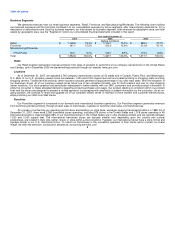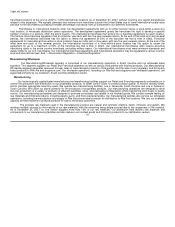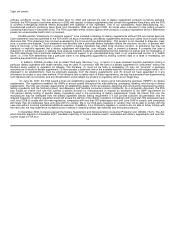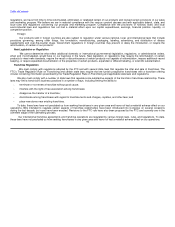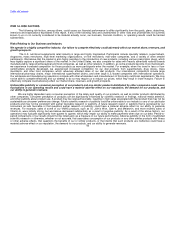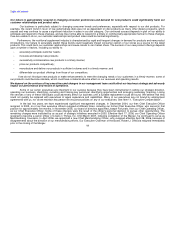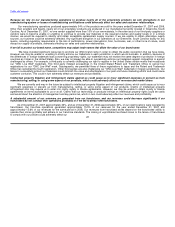GNC 2008 Annual Report Download - page 19
Download and view the complete annual report
Please find page 19 of the 2008 GNC annual report below. You can navigate through the pages in the report by either clicking on the pages listed below, or by using the keyword search tool below to find specific information within the annual report.
Table of Contents
manufacturer, packer, or distributor whose name appears on the label of the product. Records must be maintained of all adverse events for six
years after receipt. The Act also makes submission of a false report to FDA illegal. We may not be able to comply with the new requirements
without incurring substantial additional expenses.
The FDA has broad authority to enforce the provisions of the FDCA applicable to dietary supplements, including powers to issue a public
warning or notice of violation letter to a company, to publicize information about illegal products, detain products intended for import, to request
a recall of illegal products from the market, and to request the Department of Justice to initiate a seizure action, an injunction action, or a
criminal prosecution in the United States courts. The regulation of dietary supplements may increase or become more restrictive in the future.
Legislation may be introduced which, if passed, would impose substantial new regulatory requirements on dietary supplements. HR 1249
would subject the dietary ingredient dehydroepiandrosterone (DHEA) to the requirements of the Controlled Substances Act, which would
prevent our ability to sell products containing DHEA. S 2470 would amend the Controlled Substances Act to restrict the sale of DHEA-
containing dietary supplements to minors. In October 2004, legislation was passed subjecting specified substances formerly used in some
dietary supplements, such as androstenedione or "andro," to the requirements of the Controlled Substances Act. Under the 2004 law, these
substances can no longer be sold as dietary supplements.
The FTC exercises jurisdiction over the advertising of dietary supplements and over-the-counter drugs. In recent years, the FTC has
instituted numerous enforcement actions against dietary supplement companies for failure to have adequate substantiation for claims made in
advertising or for the use of false or misleading advertising claims. We continue to be subject to three consent orders issued by the FTC. In
1984, the FTC instituted an investigation of General Nutrition, Incorporated, one of our subsidiaries, alleging deceptive acts and practices in
connection with the advertising and marketing of certain of its products. General Nutrition, Incorporated accepted a proposed consent order
which was finalized in 1989, under which it agreed to refrain from, among other things, making certain claims with respect to certain of its
products unless the claims are based on and substantiated by reliable and competent scientific evidence, and paid an aggregate of $0.6 million
to the American Diabetes Association, Inc., the American Cancer Society, Inc., and the American Heart Association for the support of research
in the fields of nutrition, obesity, or physical fitness. We also entered into a consent order in 1970 with the FTC, which generally addressed "iron
deficiency anemia" type products. As a result of routine monitoring by the FTC, disputes arose concerning its compliance with these orders and
with regard to advertising for certain hair care products. While General Nutrition, Incorporated believes that, at all times, it operated in material
compliance with the orders, it entered into a settlement in 1994 with the FTC to avoid protracted litigation. As a part of this settlement, General
Nutrition, Incorporated entered into a consent decree and paid, without admitting liability, a civil penalty in the amount of $2.4 million and
agreed to adhere to the terms of the 1970 and 1989 consent orders and to abide by the provisions of the settlement document concerning hair
care products. We do not believe that future compliance with the outstanding consent decrees will materially affect our business operations. In
2000, the FTC amended the 1970 order to clarify language in it that was believed to be ambiguous and outmoded.
The FTC continues to monitor our advertising and, from time to time, requests substantiation with respect to such advertising to assess
compliance with the various outstanding consent decrees and with the Federal Trade Commission Act. Our policy is to use advertising that
complies with the consent decrees and applicable regulations. We review all products brought into our distribution centers to assure that such
products and their labels comply with the consent decrees. We also review the use of third-party point of purchase materials such as store
signs and promotional brochures. Nevertheless, there can be no assurance that inadvertent failures to comply with the consent decrees and
applicable regulations will not occur. Some of the products sold by franchised stores are purchased by franchisees directly from other vendors
and these products do not flow through our distribution centers. Although franchise contracts contain strict requirements for store operations,
including compliance with federal, state, and local laws and regulations, we cannot exercise the same degree of control over franchisees as we
do over our company-owned stores. As a result of our efforts to comply with applicable statutes and
15





